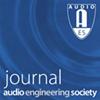线性相位八度图形均衡器
IF 1.6
4区 工程技术
Q3 ACOUSTICS
引用次数: 5
摘要
介绍了一种计算效率高的具有线性相位响应的倍频带图形均衡器。线性相位图形均衡器在相位失真不能容忍的音频应用中非常有用,例如多通道均衡、并行处理、音频设备的相位兼容性和交叉网络设计。该结构基于插值有限脉冲响应(IFIR)原理。所提出的八倍频带图形均衡器使用了一个原型低通滤波器,该滤波器是采用窗法设计的半带FIR滤波器。原型滤波器的扩展版本及其互补高通滤波器实现了所需的所有十个频带滤波器。图形均衡器以并行形式实现,其中所有带滤波器的输出,按其单独的命令增益缩放,添加以计算均衡输出信号。命令增益可以直接用作滤波器带增益。每个样本所需的操作数量仅略多于基于最小相位递归滤波器的图形均衡器所需的操作数量。与其他实现方法的比较表明,该结构所需的操作比高阶FIR滤波器少99%。与基于傅立叶变换的快速滤波方法相比,该滤波器每个样本的运算次数减少39%,延迟减少78%以上。本文章由计算机程序翻译,如有差异,请以英文原文为准。
Linear-Phase Octave Graphic Equalizer
A computationally efficient octave-band graphic equalizer having a linear-phase response is introduced. The linear-phase graphic equalizer is useful in audio applications in which phase distortion is not tolerated, such as in multichannel equalization, parallel processing, phase compatibility of audio equipment, and crossover network design. The structure is based on the interpolated finite impulse response (IFIR) philosophy. The proposed octave-band graphic equalizer uses one prototype low-pass filter, which is a half-band FIR filter designed using the window method. Stretched versions of the prototype filter and its complementary high-pass filter implement all ten band filters needed. The graphic equalizer is realized in the parallel form, in which the outputs of all band filters, scaled with their individual command gain, are added to compute the equalized output signal. The command gains can be used directly as filter band gains. The number of operations needed per sample is only slightly more than that needed for the graphic equalizer based on minimum-phase recursive filters. A comparison with other implementation approaches demonstrates that the proposed structure requires 99% fewer operations than a high-order FIR filter. The proposed filter uses 39% fewer operations per sample than the fast Fourier transform–based filtering method and causes over 78% less latency.
求助全文
通过发布文献求助,成功后即可免费获取论文全文。
去求助
来源期刊

Journal of the Audio Engineering Society
工程技术-工程:综合
CiteScore
3.50
自引率
14.30%
发文量
53
审稿时长
1 months
期刊介绍:
The Journal of the Audio Engineering Society — the official publication of the AES — is the only peer-reviewed journal devoted exclusively to audio technology. Published 10 times each year, it is available to all AES members and subscribers.
The Journal contains state-of-the-art technical papers and engineering reports; feature articles covering timely topics; pre and post reports of AES conventions and other society activities; news from AES sections around the world; Standards and Education Committee work; membership news, patents, new products, and newsworthy developments in the field of audio.
 求助内容:
求助内容: 应助结果提醒方式:
应助结果提醒方式:


